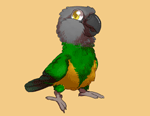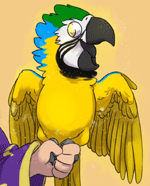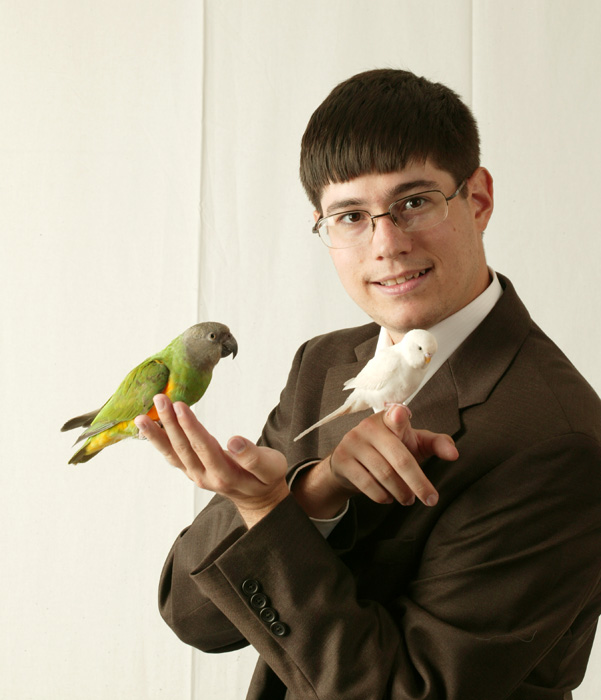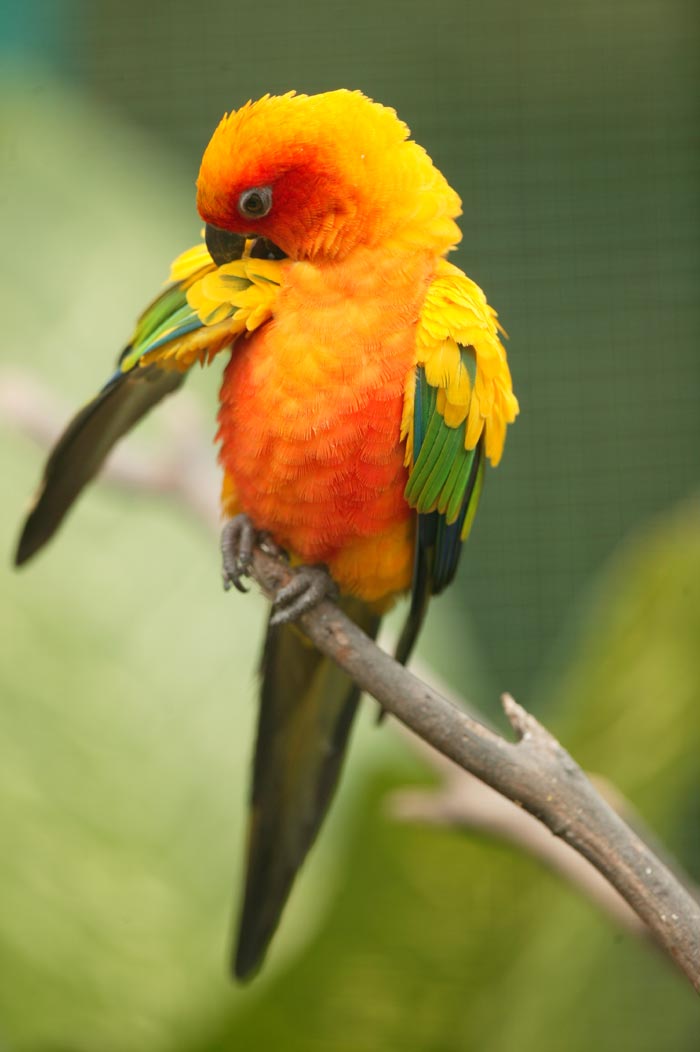 Kili
Type: Senegal Parrot
Genus: Poicephalus
Species: Senegalus
Subspecies: Mesotypus
Sex: Female
Weight: 120 grams
Height: 9 inches
Age: 17 years, 7 months
|
 Truman
Type: Cape Parrot
Genus: Poicephalus
Species:Robustus
Subspecies: Fuscicollis
Sex: Male
Weight: 330 grams
Height: 13 inches
Age: 15 years, 11 months
|
 Rachel
Type: Blue & Gold Macaw
Genus: Ara
Species:ararauna
Sex: Female
Weight: 850 grams
Height: 26 inches
Age: 13 years, 7 months
|
List of Common Parrots:
Parakeets:
Budgerigar (Budgie)
Alexandrine Parakeet
African Ringneck
Indian Ringneck
Monk Parakeet (Quaker Parrot)
Parrotlets:
Mexican Parrotlet
Green Rumped Parrotlet
Blue Winged Parrotlet
Spectacled Parrotlet
Dusky Billed Parrotlet
Pacific Parrotlet
Yellow Faced Parrotlet
Lovebirds:
Peach Faced Lovebird
Masked Lovebird
Fischer's Lovebird
Lilian's (Nyasa) Lovebird
Black Cheeked Lovebird
Madagascar Lovebird
Abyssinian Lovebird
Red Faced Lovebird
Swindern's Lovebird
Lories and Lorikeets:
Rainbow Lorikeet
Conures:
Sun Conure
Jenday Conure
Cherry Headed Conure
Blue Crowned Conure
Mitred Conure
Patagonian Conure
Green Cheeked Conure
Nanday Conure
Caiques:
Black Headed Caique
White Bellied Caique
Poicephalus Parrots:
Senegal Parrot
Meyer's Parrot
Red Bellied Parrot
Brown Headed Parrot
Jardine's Parrot
Cape Parrot
Ruppell's Parrot
Eclectus:
Eclectus Parrot
African Greys:
Congo African Grey (CAG)
Timneh African Grey (TAG)
Amazons:
Blue Fronted Amazon
Yellow Naped Amazon
Yellow Headed Amazon
Orange Winged Amazon
Yellow Crowned Amazon
Cockatoos:
Cockatiel
Galah (Rose Breasted) Cockatoo
Sulphur Crested Cockatoo
Umbrella Cockatoo
Moluccan Cockatoo
Bare Eyed Cockatoo
Goffin's Cockatoo
Macaws:
Red Shouldered (Hahn's) Macaw
Severe Macaw
Blue And Gold Macaw
Blue Throated Macaw
Military Macaw
Red Fronted Macaw
Scarlet Macaw
Green Winged Macaw
Hyacinth Macaw
Glossary of Common Parrot Terms
|
| | Thursday August 22nd, 2013 |
|
What Kind of Parrot Should I Get?
I don't know! This is one of the most common questions I come across but it's difficult to answer. It is kind of the same as asking "what kind of car should I get?" Except the outcome of making a poor choice for the parrot will be far more grave than picking the wrong car. I cannot tell you what parrot to get. What I can tell you is what questions to ask and what kind of information to look for to help you come to the right decision yourself.
This is a difficult decision for a beginner to make. Someone who has little experience with birds does not know what to look for and does not know what to avoid. It is very hard to realize these things until you live with a bird but it's not fair to get a parrot for a bit and then get it rid of it if it does not work out. I hope the advice here opens the doorway for a much greater research about what kind of parrot to get before ever getting one.
The first and perhaps the most important question when choosing a parrot is whether or not you even want a bird, a creature of the class Aves. A bird is nothing like a cat, dog, or other pet you might commonly come to think of. The distinguishing features of birds are that they have feathers, fly (yes, a few don't but we're not considering a penguin as a pet here), and make vocal noises. To many people, the idea of a flying creature in their house is unacceptable and this is perfectly reasonable. However, it is not reasonable to acquire a bird as a pet if this aspect cannot be accommodated as it is part of what being a bird naturally is.

Next comes the question, why a parrot? There are other kinds of birds that can be kept as pets as well. What about the hookbilled birds called parrots attracts you? If the answer is only that "they can talk," you are setting yourself up for disappointment when you realize that not all parrots talk and that they may choose to make noise instead of talking. The unique distinguishing features of parrots over other birds is that they are highly intelligent, social, complex birds. In other words you have to want a smart and challenging pet and not a talking hamster.
If you've determined that you like the features of parrots in general and want to continue narrowing down your search you have to stop a moment and consider the downsides of having any parrot. To different extents, all parrots are noisy, messy, costly, and can bite. Are these (and many other unmentioned issues) acceptable to you? Would you still want to keep a parrot if it never talked and only did these undesirable things? This is a very important question because that's what the majority of pet parrots do. If you aren't ready for a lot of trouble with little reward, a parrot is not going to be the pet for you.

How much time do you have available to spend both now and many many years from now? Parrots require a lot of time commitment both in terms of interaction time but also care time such as cleaning. Even if you have the time available now, are you sure you'll be able to spend just as much twenty years from now when your life situation is entirely different?
As you see, choosing the exact species of parrot is only a small factor in the bigger question of whether or not any parrot is the right pet for you from the start. Let's talk about additional resources for learning about parrots before narrowing down a species. You'll want to check out general parrot ownership books, books about parrot species, talk with other parrot owners on forums, and visit some rescues or stores to see how parrots are. There's nothing like getting a big bloody bite from a parrot to give a dose of reality over the dreamy talking shoulder bird people imagine parrots to be.
Now what about the question of "should I get a beginner parrot" or "what kinds of parrots are good for beginners?" Truth is there is no such thing as a beginner parrot. All kinds from parakeets to macaws are complex and difficult to care for. However, that said, there are some kinds that definitely are not suitable with people without any experience. Cockatoos, Amazons, Macaws, African Greys, and Eclectus are virtually never advisable for beginners. Not only are these types of parrots extremely difficult to care for but also beginner mistakes in the early stages can lead to substantial problems for the birds down the line (such as incurable biting, plucking, and screaming). Does this mean that all other kinds of parrots are beginner birds? No way. Conures, Poicephalus, Caiques, Parakeets, Cockatiels, Lovebirds, Parrotlets, etc are all great birds that could satisfy any expert owner. Just these parrots are smaller and less prone to extreme problems as some of the previously mentioned kinds.

I am by no means saying that if you want a Cockatoo that you should first get a Cockatiel to learn on and then get the Cockatoo. What I am saying is that if you've never owned a parrot before, you will not have the experience to even be able to evaluate whether or not such a challenging bird is even remotely within your grasp. Just seeing a baby Cockatoo at a store and being able to pet it is absolutely no indication that you will be able to handle that kind of bird when it goes through maturity. All the research on the internet will never come close to handling real bites, noise, mess, etc. If you are really set on getting any of the larger species outright, the best thing you can do to evaluate if one is right for you is visiting a rescue. Don't kid yourself that the birds you see there are the worst ones. Most of them are really like that. If you can't see yourself wanting one from a rescue, almost certainly you won't like what the baby of that species turns out like as an adult.
People getting their first parrot often fixate on the price of the bird. But in reality this is the cheapest part of getting one and should play much less of a role than it does. The cost of keeping the parrot will be far more than the initial purchase price. You can often expect to spend what the parrot cost (or would cost in a store) yearly on supplies/food/vet alone.
But when it comes to choosing between a lovebird and a parrotlet or a budige and a cockatiel, how do you know what to get? This is still a question that only you can answer. But it is far more important to look at the typical undesirable traits of that species rather than desirable ones. Sure it's easy to say that the nice thing about Conures is that they are colorful and playful. But can you handle the noise and biting? Or Senegal Parrots are desired for their relative quietness but can you handle the aggression and one-person bonding? Many species may seem nice on the pros side but the cons may be entirely unbearable and bar you from ever owning it. A Cockatoo may seem playful and friendly but in an apartment the noise level will just be impossible.
More considerations when determining what kinds of species you can even consider include:
Size: do you have adequate room for a huge cage for a bird of this size? Do you have adequate space for a bird of this size to fly for exercise?
Noise: will everyone in your household be able to tolerate endless noise of the volume this bird is capable of? But not just immediate household, what about neighbors?
Bite: take a look at that beak. Will you be able to take a bite without flinching? What if this bird always wants to bite you, will you still take good care of it?
Cost: will you be able to afford to keep the parrot, not just buy it up front? Do you realize that you will probably have to spend about what the bird costs every year on upkeep?
Mess: how much of a mess can you tolerate? How much time do you have for cleaning? Can you deal with favorite possessions getting destroyed?
I realize that I raise more questions than I provide answers. Beginners want a straightforward answer to the age old question what parrot should I get? But it's really not something anyone can answer but yourself. But in order not to disappoint those reading this that insist on me choosing a parrot for them, I will leave you with one solid answer. If in doubt and unable to choose, get a Cockatiel. They embody many of the best features of parrots and fewer of the bad ones. Cockatiels are pretty looking, not too noisy, less messy, less costly to keep, less aggressive, can make do with any size household, and yet they can still be cuddly, loving, and exciting to have. Cockatiels are easy to read because of their expressive crest and tend to get along well in a flock environment. With some taming and training even the wildest of Cockatiels can become hand tame. These birds are also less likely to hold grudges and will with time forgive beginner mistakes.

So in your search for the right parrot for you, remember to do lots of research, talk to parrot owners, see parrots in person, identify the pros and cons of various species, estimate your long term budget, and figure out the best parrot for you and your household. For even more information about choosing a parrot, bringing it home, and a complete approach to parrot keeping, get a copy of my book: The Parrot Wizard's Guide to Well-Behaved Parrots.
Part of: General Parrot Care, Blog Announcements
Parrot Species Parakeet |
|





 Previous Article
Previous Article Next Article
Next Article